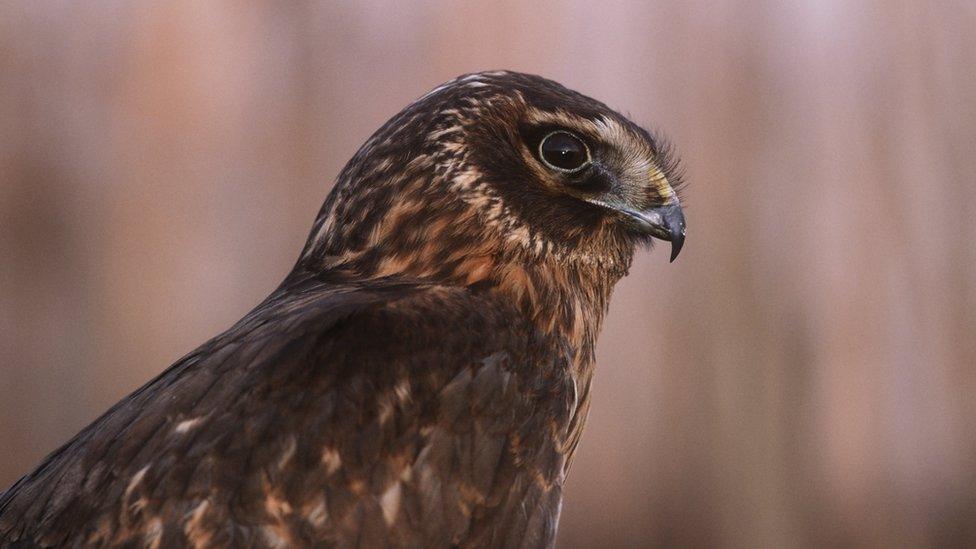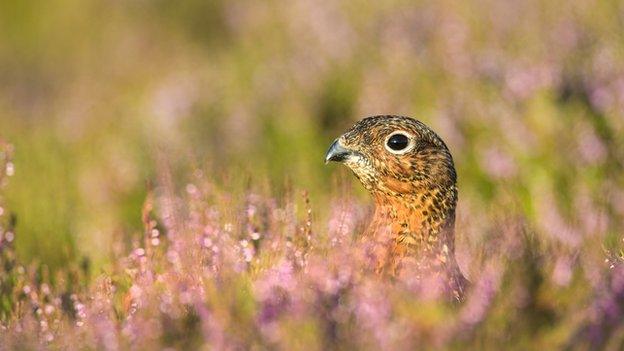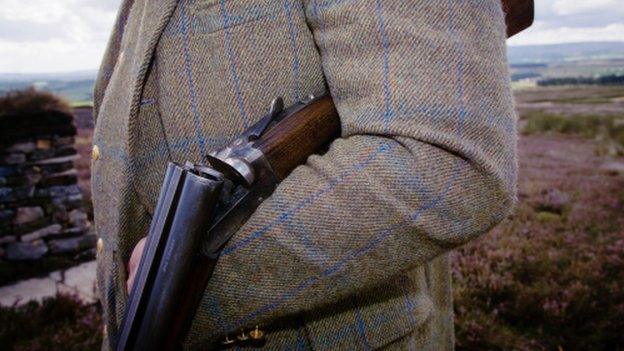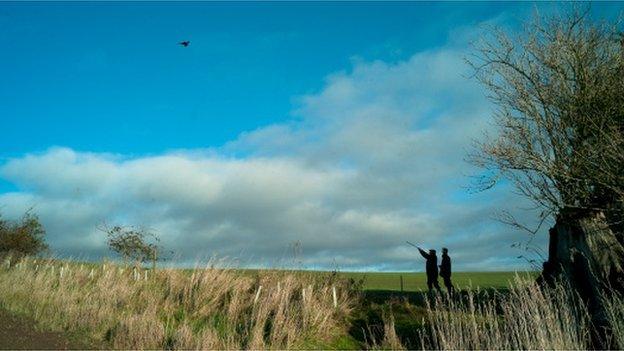Growing call for grouse shooting ban as season opens
- Published

There are believed to be only three breeding pairs of hen harriers left in England
More than 80,000 people have signed an online petition calling for a ban on grouse shooting as the season starts.
Critics argue that the sport is directly contributing to a rapid fall in the number of hen harriers, an endangered species of raptors.
The birds prey on red grouse chicks as part of their diet.
Conservationists argue that gamekeepers who manage the moors where the birds are reared kill hen harriers to preserve their grouse stocks.
It's thought that there are only three breeding pairs of hen harriers left in England.
Rural benefits
Countryside groups and the government say that grouse shooting is a legitimate activity that brings significant benefits to the rural economy.
They also argue that gamekeeper management helps other moorland bird species.
They say that by keeping fox numbers down, other species of birds such as lapwings, curlews and golden plovers are allowed to flourish.

The official grouse hunting season runs from August to December
The online petition against grouse shooting has been organised by the League Against Cruel Sports (LACS), the wildlife presenter Chris Packham and environmental campaigner Dr Mark Avery.
In a statement, the LACS said: "Momentum against grouse shooting is surging amid reports of continued raptor persecution and environmental damage linked to intensively managed grouse moors … the petition looks set to reach 100,000 signatures - which could trigger a debate in parliament."
Jeff Knott, head of nature policy at the RSPB said that the illegal killing of birds of prey "tarred the reputation of every grouse moor estate and every shooter."
"There are also serious concerns about the environmental damage caused by other management practices these moors increasingly rely on, such as the draining and vegetation burning of the natural landscape, and the large scale killing of mountain hares."
The organisation recently pulled out of the governments' Hen Harrier Action Plan, external which attempted to reach an agreement between parties on both sides of the debate.
The RSPB said it "failed to deliver the urgent action needed". It now wants a licensing scheme to be introduced.

The government says it is working with 'key interested parties' to manage the uplands.
The Countryside Alliance argues that grouse shooting has huge benefits for the rural economy.
"With £100m invested annually in conservation by grouse shoots in England, Wales and Scotland the Glorious Twelfth is indeed a glorious day," they said in a statement, referring to the date that the season opens.
"Grouse shooting brings many benefits to the countryside in terms of conservation and the economy.
"Landscape-scale conservation means internationally threatened wader species are 3.5 times more likely to raise a chick to fledging on moors managed by gamekeepers and with tens of millions of pounds invested in remote rural communities every year by moorland managers and travelling grouse shooters the Glorious Twelfth is a day for the shooting community to be proud."
There is no sign that the government intends to alter the law. In its response to the online petition, the Department for Environment, Food and Rural Affairs (Defra) says the government is "working with key interested parties to ensure the sustainable management of uplands, balancing environmental and economic benefits, which includes the roles of sustainable grouse shooting."
Bitter divide
The red grouse and hen harrier issue inspires deep emotions in those interested in rural affairs. The former international cricketer Sir Ian Botham, who leads the Don't Forget the Birds campaign, says that the RSPB position is "allowing foxes to kill birds."
Sir Ian and the wildlife presenter Chris Packham are engaged in a bitter public row.
Mr Packham has called for Marks and Spencer and Iceland not to stock red grouse, saying it is "toxic".

The shooting industry is said to contribute £70 million to the rural economy.
Sir Ian has responded by saying that "the best friends of Britain's endangered wild birds are gamekeepers," and that Mr Packham should "spend more time with the birds and away from the cameras."
The grouse shooting season runs from August 12th to December 10th.
In June, the National Trust banned shooting on land it owns in Derbyshire.
Follow Claire on Twitter @BBCMarshall, external.